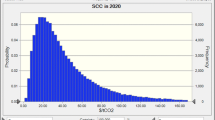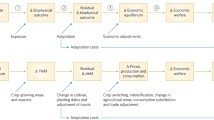Abstract
Continuing a discussion on the intertemporal accounting of climate-change damages initiated by Nordhaus, Heal and Brown in response to the recent demonstration of Hasselmann et al. that standard exponential discounting applied uniformly to all goods and services invariably leads to a 'climate catastrophe' in cost-benefit analyses, it is argued that (1) there exists no economically satisfactory alternative to cost-benefit analysis for the determination of optimal climate protection strategies, and (2) it is essential to allow for the different long-term evolution of climate damage costs relative to mitigation costs in determining the optimal cost-benefit solution. A climate catastrophe can be avoided only if it is assumed that climate damage costs increase significantly in the long term relative to mitigation costs. Cost-benefit analysis is regarded here in the generalized sense of optimizing a social welfare function that incorporates all relevant 'quality-of-life' factors, including not only consumption and the value of the environment, but also the ethical values of equitable intertemporal and intrasocietal distribution. Thus, economic efficiency and climate stewardship are not regarded as conflicting goals, but as synonyms for a single encompassing economic optimization exercise. The same reasoning applies generally to the problem of sustainable development. To quantify the concept of sustainable development in cost-benefit analyses, the projected time evolution of the future values of natural resources and the environment (judged by the present generation, acting as representative agents of future generations) must be related to the time-evolution of all other relevant quality-of-life factors. Different ethical interpretations of the concept of sustainable development can be readily operationalized by incorporation in a generalized cost-benefit analysis in which the evolution paths of all relevant material and ethical values are explicitly specified.
Similar content being viewed by others
References
Arrow, K. J.: 1970, Social Choice and Individual Values, 2nd. edn., Yale University Press, New Haven, p. 124.
Arrow, K. J., Cline, W. R., Maler, K.-G., Munasinghe, M., Squitieri, R., and Stiglitz, J. D.: 1996, 'Intertemporal Equity, Discounting, and Economic Efficiency', in Bruce, J. P., Lee, H., and Haites, E. F. (eds.), Climate Change 1995, Economic and Social Dimensions of Climate Change, Contribution of Working Group III to the Second Assessment Report of the Intergovernmental Panel on Climate Change, Ch. 4, Cambridge University Press, Cambridge, pp. 125-144.
Brown, P. G.: 1997, 'Stewardship in Climate. An Editorial Comment', Clim. Change 37, 329-334.
Chichilnisky, G.: 1996, 'An Axiomatic Approach to Sustainable Development', Social Choice Welfare 13, 231-257.
Chichilnisky, G., Heal, G., and Beltratti, A.: 1995, 'The Green Golden Rule', Econ. Lett. 49, 175-179.
Cline, W. R.: 1992, The Economics of Global Warming, Inst. Internat. Econ., p. 399.
Cropper, M. L., Aydede, S. K., and Portney, P. R.: 1994, 'Preferences for Life Saving Programs: How the Public Discounts Time and Age', J. Risk Uncertainty 8, 243-265.
Fisher, I.: 1907, The Rate of Interest, Macmillan, New York, p. 442.
Goulder, L. H. and Schneider, S. H.: 1998, 'Induced Technological Change and the Attractiveness of CO2 Abatement Policies, Resour. Energy Econ., in press.
Grubb, M.: 1997, 'Energy Technologies, Systems and the Timing of CO2 Emissions Abatement', Energy Policy 25, 159-172.
Grubb, M., Duong, M. H., and Chapuis, T.: 1994, 'Optimizing Climate Change Abatement Responses: On Inertia and Induced Technological Development', in Nakicenovic, N., Nordhaus, W. D., Richels, R., and Toth, F. L. (eds.), Integrative Assessment of Mitigation, Impacts and Adaptation to Climate Change, International Institute for Applied Systems Analysis, Laxenburg, pp. 513-534.
Hackett, D. C.: 1998, Environmental and Natural Resource Economics. Theory, Policy and the Sustainable Society, M. E. Sharpe, Armonk, New York, London, p. 327.
Harvey, C: 1986, 'Value Functions for Infinite Period Planning', Manage. Sci. 32, 1123-1139.
Hasselmann, K.: 1997, 'Climate Research after Kyoto', Nature 390, 225.
Hasselmann, K., Hasselmann, S., Giering, R., Ocana, V., and v. Storch, H.: 1997, 'Sensitivity Study of Optimal CO2 Emissions Using a Simplified Structural Integrated Assessment Model (SIAM)', Clim. Change 37, 345-386.
Heal, G.: 1997, 'Discounting and Climate Change. An Editorial Comment', Clim. Change 37, 335-343.
Henderson, N. and Bateman, I.: 1995, 'Empirical and Public Choice Evidence for Hyperbolic Social Discount Rates and the Implications for Intergenerational Discounting', Environ. Res. Econ. 5, 413-423.
Horowitz, J.: 1996, 'Environmental Policy under a Non-Market Discount Rate', Ecol. Econ. 16, 73-78.
Hotelling, H.: 1931, 'The Economics of Exhaustible Resources', J. Polit. Econ. 39, 137-175.
Howarth, R. B.: 1996, 'Discount Rates and Sustainable Development', Ecol. Model. 92, 263-270.
Howarth, R. B. and Nogaard, R. B.: 1995, 'Intergenerational Choices under Global Environmental Change', in Bromley, D.W. (ed.), Handbook of Environmental Economics, Blackwell Handbooks in Economics, pp. 111-138.
IPCC: 1996, Bruce, J. P., Lee, H., and Haites, E. F. (eds.), Climate Change 1995, Economic and Social Dimensions of Climate Change, Contribution of Working Group III to the Second Assessment Report of the Intergovernmental Panel on Climate Change, Cambridge University Press, Cambridge, p. 448.
Kemp, M. C., Long, N. V., and Shimomura, K.: 1984, 'The Problem of Survival: A Closed Economy', in Kemp, M. C. and Long, N. V. (eds.), Essays in the Economics of Exhaustible Resources, North-Holland, Amsterdam, pp. 13-26.
Koopmans, T.: 1960, 'Stationary Ordinal Utility and Impatience', Econometrica 28, 287-309.
Krutilla, J. V. and Fisher, A. C.: 1975, The Economics of Natural Environments, Resources for the Future, p. 300.
Lowenstein, G. and Thaler, R.: 1989, 'Intertemporal Choice', J. Econ. Perspect. 3, 181-193.
Malthus, T. R.: 1798, An Essay on the Principle of Population, 1st. edn., Wrigley, E. A. and Souden, D. (eds.), Pickering, London (1986), p. 139.
Meadows, D. H., Meadows, D. L., Randers, J., and Behrens, W. W.: 1972, The Limits to Growth, Signet, New York.
Morgan, M. G. and Dowlatabadi, H.: 1996, 'Learning from Integrated Assessment of Climate Change', Clim. Change 34, 337-368.
Nordhaus, W. D.: 1993, 'Rolling the “DICE”: An Optimal Transition Path for Controlling Greenhouse Gases', Res. Energy Econ. 15, 27-50.
Nordhaus, W. D.: 1997, 'Discounting in Economics and Climate Change. An Editorial Comment', Clim. Change 37, 315-328.
Norgaard, R. B.: 1994, Development Betrayed, Routledge, London, p. 280.
Petschel-Held, G., Schellnhuber, H.-J., Bruckner, T., and Hasselmann, K.: 1999, 'The Tolerable Windows Approach: Theoretical and Methodological Foundations', Clim. Change 41, 303-331.
Pearce and Atkinson: 1995, 'Measuring Sustainable Development, in Bromley, D. W. (ed.), Handbook of Environmental Economics, Blackwell Handbooks in Economics, pp. 166-181.
Pigou, A. S.: 1932, The Economics of Welfare, Macmillan, London, p. 837.
Rawls, J.: 1971, A Theory of Justice, Harvard University Press, Cambridge, MA, p. 607.
Ricardo, D.: 1821, The Principles of Political Economy and Taxation, Penguin, Harmondsworth (1971), p. 427.
Schneider, S. H.: 1997, 'Integrated Assessment Modeling of Global Climate Change: Transparent Rational Tool for Policy Making or Opaque Screen Hiding Value-Laden Assumptions?', Environ. Model. Assess. 2, 229-249.
Strotz, R.: 1956, 'Myopia and Inconsistency in Dynamic Utility Optimization', Rev. Econ. Studies 23, 165-180.
Tahvonen, O., v. Storch, H., and v. Storch, J.: 1994, 'Economic Efficiency of CO2 Reduction Programs', Clim. Res. 4, 127-141.
Thaler, R.: 1981, 'Some Empirical Evidence on Dynamic Inconsistency', Econ. Lett. 8, 201-207.
Tol, R. S. J.: 1999, 'Time Discounting and Optimal Emission Reduction: An Application of FUND', Clim. Change 41, 351-362.
Toman, M. A., Pezzey, J., and Krautkraemer, J.: 1995, 'Neoclassical Economic Growth Theory and “Sustainability”', in Bromley, D. W. (ed.), Handbook of Environmental Economics, Blackwell Handbooks in Economics, pp. 139-165.
Wigley, T. M. L., Richels, R., and Edmonds, J. A.: 1996, 'Economic and Environmental Choices in the Stabilization of Atmospheric CO2 Emissions (1996)', Nature 379, 240-243.
Winston, G. and Woodbury, R.: 1991, 'Myopic Discounting: Empirical Evidence', in Kaish, S. and Gilad, B. (eds.), Handbook of Behavioral Economics, Vol. 2B, JAJ Press, Greenwich, CT, pp. 325-345.
Author information
Authors and Affiliations
Rights and permissions
About this article
Cite this article
Hasselmann, K. Intertemporal Accounting of Climate Change – Harmonizing Economic Efficiency and Climate Stewardship. Climatic Change 41, 333–350 (1999). https://doi.org/10.1023/A:1005441119269
Issue Date:
DOI: https://doi.org/10.1023/A:1005441119269




